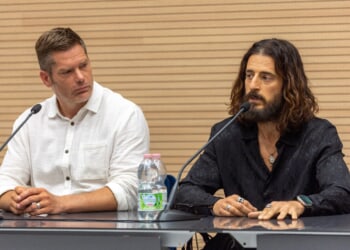A Japanese professor recently made a stunning discovery. How you handle tough times shapes how meaningful your life feels, and here I was thinking I just needed a solid playlist and strong Wi-Fi. This earth-shattering revelation required a 15-page academic paper with something called a “geographic model of meaning in life.” Professor Masahiro Morioka spent years researching what your grandmother knew instinctively. He calls life’s challenges “solicitations” that invite “phenomenological” dialogue. Normal people call this choosing how to handle problems. But normal language doesn’t pay the mortgage.
Morioka joins academia’s proud tradition of repackaging obvious truths as revolutionary discoveries. The formula is straightforward: mix common sense with a hefty dose of impressive-sounding drivel, publish papers, secure funding. Rinse, then repeat. (RELATED: Why Are People Fleeing Highly Educated States?)
Humanity’s finest minds, it seems, have finally proven that water is wet, only with calculus.
Psychology leads this intellectual fraud. “Positive psychology” researchers spent decades proving that optimistic people feel happier and — brace yourself — tend to function better socially. Millions in research grants confirmed what people with a functioning brain and bumper stickers already knew. “Resilience research” took it a step further, discovering that people who bounce back from adversity… tend to bounce back from adversity.
Educational psychology has turned the obvious into a cottage industry. Academics publish peer-reviewed studies confirming that students learn better when teachers explain things clearly and don’t yell at them. Additional research reveals that kids respond better to encouragement than nonstop criticism, and that engaged students tend to do better than the ones staring at the clock, counting the minutes until lunch. Each “finding” is filled with jargon-heavy abstracts and overly long methodology sections, simply stating what every non-degenerate already knows instinctively. (RELATED: Keep the End in View)
The mindfulness movement offers another goldmine of rediscovered wisdom. Thousands of studies were needed to prove that meditation reduces stress, lowers anxiety, and improves focus — findings that Buddhist monks have been whispering for about 2,500 years. Western scientists, armed with fMRI machines and statistical software, have now confirmed what anyone who’s ever taken a deep breath already suspected. The conclusions are identical. Only the vocabulary is exponentially more complex, and now comes with podcast appearances.
Business schools repurpose ancient common sense and sell it back to CEOs for millions. Management consultants gush over “human-centered design thinking paradigms,” which, when translated, means asking customers what they want and then giving it to them. Once-lost insights like “treat employees with respect” and “listen to your users” are now trademarked, branded, and billed as proprietary methodology. Entire MBA programs revolve around giving simple ideas overly complicated names, just so they can be monetized. (RELATED: Higher Education’s 7 Deadly Sins)
Communication studies remain a never-ending well of redundant revelations. Academics build careers proving that people communicate more effectively when they, you know, listen to each other. Research confirms that clear messages work better than vague, confusing ones. Shocking. Studies also reveal that nonverbal cues affect how messages are interpreted. For this, entire theoretical frameworks are constructed, with names like “Constructivist Interpersonal Communication Theory.” Because saying “eye contact matters” isn’t quite smart enough.
Sociology is no stranger to the absurd. Researchers painstakingly demonstrate that social support helps people cope with adversity. More studies show that inequality shapes life outcomes and that culture influences human behavior. All true. All old news. These are insights that novelists, philosophers, and even a homeless bum could have told you without any regression model. And then there’s economics, the reigning champion of rediscovering the obvious.
Academics spend entire careers proving that people prefer more money to less money. That prices rise when demand increases. That recessions lead to unemployment.
These revelations come wrapped in pages of complex equations and require entire departments to produce. Nobel Prizes are handed out for confirming that incentives matter. Humanity’s finest minds, it seems, have finally proven that water is wet, only with calculus.
The irony runs deep. Academia claims to seek truth while systematically obscuring it through unnecessary complexity. Professors who could explain concepts clearly choose terminology that impresses colleagues while confusing everyone else.
Morioka’s paper is a case study in everything wrong with modern academic discourse. He took timeless wisdom — face adversity with courage — and smothered it in preposterous padding. The result sounds scholarly, reads like a thesis defense, and says nothing Marcus Aurelius didn’t express more clearly (and in fewer words) two thousand years ago.
The academic-industrial complex transforms obvious truths into career opportunities. Common sense becomes intellectual property. Ancient wisdom becomes cutting-edge science.
Professors advance by complicating simple ideas, not by explaining them well. Graduates leave with fancy terms for things they already understood in high school, just dressed in academic drag.
The solution is not rocket science. It’s radical simplicity. Kill the fluff. When research confirms the obvious, say so. Reward clarity over clutter. Prioritize substance over semantics.
But that would upend the whole academic ecosystem. Thousands of professors would be out of a job. Entire departments would vanish overnight. The education-industrial complex runs on the business of making the simple look sophisticated. In other words, clear communication isn’t a virtue; it’s a threat.
Morioka’s “geographic model” will probably win awards. Other researchers will cite it. The cycle will roll on. Timeless wisdom will be buried deeper under another layer of institutional pretension.
READ MORE from John Mac Ghlionn:

![Man Arrested After Screaming at Senators During Big Beautiful Bill Debate [WATCH]](https://www.right2024.com/wp-content/uploads/2025/06/Man-Arrested-After-Screaming-at-Senators-During-Big-Beautiful-Bill-350x250.jpg)














